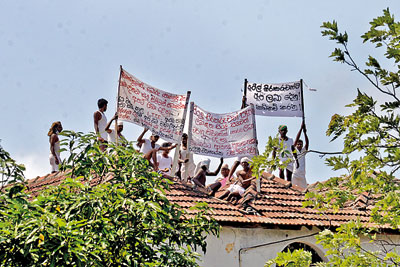News
‘Death row where some are more equal than others’
A group representing the rights of prisoners says it is preparing to file a Fundamental Rights (FR) Petition in the Supreme Court stating that the presidential pardon granted to ex-MP Duminda Silva has violated the constitutional right to equality of other death-row inmates.
“The President is constitutionally empowered to pardon Duminda Silva. Our contention is that through the pardon, the right to equality guaranteed under Article 12 (1) of the Constitution of other death-row inmates has been violated,” Committee for Protecting Rights of Prisoners (CPRP) president Senaka Perera, told the Sunday Times.
Article 12 (1) of the Constitution notes that, “All persons are equal before the law and are entitled to the equal protection of the law.”

Prisoners protest demanding equal treatment after Duminda Silva was released on a presidential pardon
Duminda Silva, who had been sentenced to death for the murder of four persons including former presidential advisor Bharatha Lakshman Premachandra, was controversially pardoned by President Gotabaya Rajapaksa on Poson Poya Day.
Mr Silva was sentenced to death by a High Court after being found guilty of the murders, while his conviction was also upheld by a five Judge Bench of the Supreme Court headed by then Chief Justice Priyasath Dep. Yet, President Rajapaksa’s pardon allowed Mr Silva to walk out of prison after less than five years.
There are about 500 prisoners currently on death row, according to the Department of Prisons.
“The pardon clearly shows that Silva was singled out for special treatment. We are asking why other death row inmates are not entitled to the same consideration. Many of them have been in prison for far longer than him. The pardon is a violation of their constitutional right guaranteeing equality before the law.”
The CPRP is hopeful of filing the FR petition in the coming week, Mr Perera said.
A hunger strike begun by death row inmates at the Welikada and Mahara Prisons soon after Mr Silva’s release was called off on Wednesday (30) following discussions between inmates, Prisons Department officials and those from the State Ministry of Prison Management and Prisoners’ Rehabilitation.
More than 150 death row inmates took part in the hunger strike, while some others staged a protest on the roof of Chapel Ward at the Welikada Prison. The prisoners’ main demand was for their death sentences to be commuted to life imprisonment. They also asked for life imprisonment to be shortened to 20 years and for the reinstatement of the four yearly evaluation of the rehabilitative progress of all convicted prisoners.
“The prisoners aren’t asking for immediate release like Duminda Silva. Their demands are more than reasonable,” Mr Perera further asserted.
Prisons Spokesman Chandana Ekanayake said talks between the Prisons Department, the State Ministry of Prison Management and Prisoners’ Rehabilitation and the Justice Ministry were proceeding on commuting the death sentences of prisoners to life imprisonment and reducing life imprisonment to a period of 20 years.
Mr Ekanayake however, said the Department of Prisons will not recommend such relief or pardons for any of the prisoners who took part in the rooftop protest as their actions had threatened the security of the entire prison.
Mr Perera of CPRP blasted the decision to penalise the rooftop protesters, saying it was only through their actions and those of the hunger strikers, that the government was moved to at least take some action towards looking into the plight of such prisoners. “The prisoners launched the protest because they were left with no other option. It is unjust to penalise them for doing what they did to draw attention to entirely reasonable demands.”
President Gotabaya Rajapaksa has been sent a list containing 253 names of death row inmates recommending that their sentences be commuted to life imprisonment, and for life imprisonment to be reduced to a term of 20 years, State Minister of Prison Management and Prisoners’ Rehabilitation Lohan Ratwatte said. The prisons department and the ministry have recommended the commuting of the death sentences of these inmates owing to good behaviour and progress made in rehabilitation, he added.
“We are yet to hear from the President. We believe he has sought the Attorney General’s advice on the matter, but we are hopeful of a positive response,” State Minister Ratwatte stated.
He however, said as things stand currently, not all death row inmates will have their death sentences commuted to life. That matter is still being discussed.
Mr. Ratwatte said he did not expect death row inmates to recommence their protests on the matter. “Climbing rooftops and refusing food will not resolve these issues. I have informed the prisoners that if they have grievances, they should be conveyed properly to prison authorities and to myself. They have no problem approaching me,” he insisted.
CPRP President Perera, though, said the problem still remained. “The government is trying to mislead the prisoners and the international community. There will be no solution until their grievances are addressed,” he asserted.

